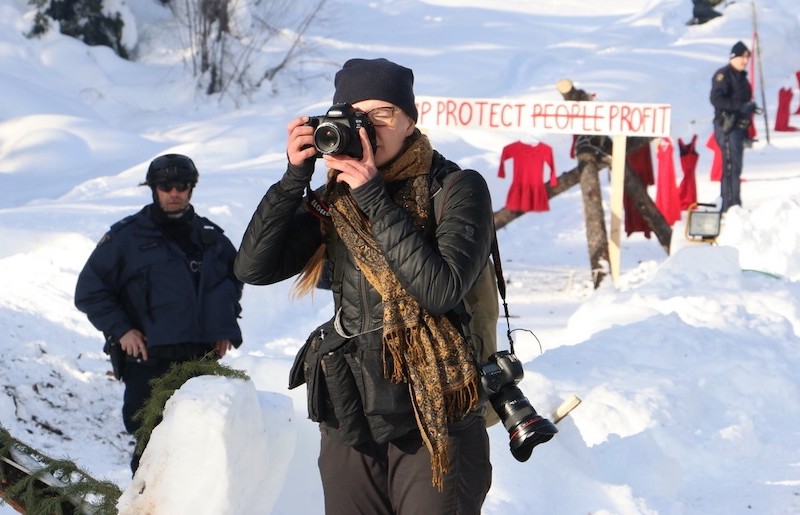As I write this, two colleagues are sitting in a jail cell in Prince George, B.C. They were arrested Friday as journalists doing their jobs.
I met award-winning photojournalist Amber Bracken nearly two years ago at the Unist’ot’en Healing Centre, where we were covering the last police action on Wet’suwet’en territory.
I learned a lot from her. Things like, carry the essentials at all times — you never know when a raid might happen. Write your lawyer’s name on your arm. And don’t argue with police. Stay out of their way and keep shooting.
Just tell the story.
Bracken won an award for her coverage and professionalism at Unist’ot’en. She is incredibly grounded, even when working under pressure. She is deeply committed to telling stories.
Michael Toledano is a documentary filmmaker who has dedicated years to capturing footage of the pipeline standoff that has unfolded on Wet’suwet’en territory for more than a decade. We met for the first time when I travelled to a camp on Gidimt’en Clan territory along the Morice West Forest Service Road for this story in December 2019. Days later, Wet’suwet’en Hereditary Chiefs closed the road, leading to the February 2020 police action.
Toledano was also at Unist’ot’en that year, along with journalist and documentary filmmaker Melissa Cox. All three were arrested this week. Toledano and Bracken remain in police custody.
Cox was arrested Thursday and released the same day. In a video of the arrest, she can be heard repeatedly telling police “I’m media” as she’s taken into custody. She told me after her release that she felt police targeted her because she was holding a video camera.
Including Cox, 15 people were arrested that day. Eight were released with conditions the following day. Five remain in custody awaiting a bail hearing in Prince George on Monday.
RCMP framed Thursday’s arrests as a rescue mission, as they worked to open the road and bring supplies into Coastal GasLink work camps that had been cut off after Wet’suwet’en Hereditary Chiefs closed the Morice road a week ago. By Thursday evening, the road was open and supplies were flowing, according to RCMP and Coastal GasLink.
The following day, Toledano and Bracken were among those inside a small cabin that was blocking access to a site where Coastal GasLink plans to drill under Morice River, known to the Wet’suwet’en as Wedzin Kwa.
They weren’t there to block access. They were there to tell the stories of those who were.
A series of dramatic posts to the Gidimt’en Twitter account that day describes RCMP breaking down the doors of the cabin using an axe and police dogs.
Then, at 12:40 p.m., the communications stopped.
12:40pm, Nov 19, 2021: Tiny House breached w/ axe and K9 unit by #RCMP on behalf of #CoastalGasLink. Cabin breached w/ chainsaw. Unarmed Indigenous women in both structures. No warrants. Heavy machinery, assault weapons. Media, communications blocked. #Wetsuweten #shutdowncanada
— Gidimt’en Checkpoint (@Gidimten) November 19, 2021
I wasn’t there when RCMP broke through that door. I don’t know what happened next. As of yet, no footage has surfaced. But I have a pretty good idea.
Amber Bracken likely was trying to stay out of the way. She likely just kept shooting.
But all we have is the RCMP account of what took place.
“The individuals failed to comply and officers broke through the doors, entered the structures and arrests were made without incident,” the statement says. “Police can confirm that among those inside the structures were two individuals who later identified themselves as independent journalists.”
RCMP say 11 people were arrested at the cabin Friday, in addition to four more at the site of Thursday’s arrests. They all await Monday’s bail hearing in Prince George.
Arrests condemned
The Canadian Association of Journalists has demanded Bracken and Toledano’s immediate release. The Coalition for Women in Journalism says it condemns Bracken’s arrest.
The Narwhal, the publication Bracken was on assignment for at the time of her arrest, was among a coalition of journalism organizations that won a challenge to RCMP overreach at old-growth logging protests on Vancouver Island this summer.
Narwhal co-founder Carol Linnitt says there has been a wave of support from lawyers and other media outlets who are working to get Bracken and Toledano released. “We want her out of jail today,” she says.
Linnitt says Bracken was issued a letter of assignment from the Narwhal. Her gear was also plastered in “press” identification, clearly identifying her as a journalist.
I was too confidant that it wasn’t going to be an enforcement trip that I didn’t think to print or bring a “press credential”. Well shit, now I have a tuck tape special. pic.twitter.com/E5djhW0lEs
— Amber Bracken (@photobracken) November 18, 2021
“The Narwhal also reached out to multiple spokespeople and liaison officers with the RCMP to let them know and confirm that Amber is on the ground in the injunction zone reporting on assignment for the Narwhal,” she says.
RCMP said Bracken didn’t identify herself as a journalist. Linnitt doesn’t believe that. “It stretches the limits of the imagination how they could come to that conclusion,” she says.
“It’s very frustrating as an editor because you want to do everything that you can to protect any journalist, staff or freelancer, that you’re sending into a potentially dangerous reporting environment. At the Narwhal, we did everything we possibly could to ensure Amber’s safety and that’s part of the reason it’s so incredibly frustrating to not only see her arrested but detained and jailed,” she says.
At this point, no one knows the whereabouts of Bracken and Toledano’s equipment or footage gathered leading up to and during their arrests.
RCMP news releases say that “all enforcement actions were documented, including the use of video and body worn cameras.”
That documentation is not a substitute for solid, on-the-ground journalism.
On Thursday, I went behind the RCMP checkpoint on the Morice to report on police action that began that morning, the day before Bracken and Toledano were arrested. After travelling the hour and a half from my home in Smithers, I almost didn’t have that chance.
The first RCMP officer I spoke to told me I wouldn’t be allowed past the checkpoint, to where the arrests were taking place. After not-so-patiently explaining to the officer that as a journalist I had a right to tell the story that was unfolding beyond the police vehicles blocking my path, I was allowed past with a police escort. By the time I arrived, the arrests were over and RCMP were processing people.
I got photos. I got a story. But it was a limited version that police wanted to share.
When ‘embedded’ with protesters
Press freedom isn’t just a lofty ideal — it’s enshrined in Canadian law, meant to ensure journalists are allowed to do their jobs, even as heavily-armed police officers descend on an evidently peaceful Indigenous protest.
The RCMP’s legal argument for detaining Bracken and Toledano has been that they were “embedded” in the Wet’suwet’en protests.
Embedding oneself is essential to good storytelling. Canadian courts have defended journalists’ right to embed themselves in the interest of telling stories.
In fact, they have gone so far as to describe it as the path to reconciliation.
In 2019, the Newfoundland Court of Appeal dropped contempt charges against APTN journalist Justin Brake who had been covering the Muskrat Falls protest, an Indigenous protest against a hydropower project.
In the decision, Judge J.A. Green acknowledged that applying the injunction order too broadly “unnecessarily risks impeding the media function for no good reason with the result that the public would be deprived of access to information of public interest.”
That risk was greater when it came to Indigenous protests, Green added.
“The evidence from APTN, which I accept, is that Aboriginal communities have been historically underrepresented in the Canadian media. That makes freedom of the press to cover stories involving Indigenous land issues even more vital,” he said.
“To achieve the goal of reconciliation, better understanding of Aboriginal peoples and Aboriginal issues is needed. This places a heightened importance on ensuring that independently reported information about Aboriginal issues, including Aboriginal protests, is available to the extent possible.”
More recently, courts here in B.C. acknowledged the importance of press freedoms when Justice Douglas Thompson admonished police in a recent decision that temporarily removed an injunction against old-growth logging protesters at Fairy Creek on Vancouver Island.
In the BC Supreme Court decision, which was issued in September, Thompson noted that the “media’s right of access continues to be improperly constrained.”
In other words: Good journalism can mean embedding yourself.
When a journalist gains access, they gain access for everyone. We are the eyes and ears of the public. News releases from RCMP, government and industry rarely tell the whole story. If you’re not on the ground, you’re not getting the complete story.
That’s why we need more journalists like Amber Bracken, Michael Toledano and Melissa Cox. Journalists willing to take the time, to understand the story and to be there when the arrests happen. No journalist should be detained for any length of time for doing their job.
Press freedom isn’t for journalists. It’s for everyone. ![]()
Read more: Rights + Justice, Media
















Tyee Commenting Guidelines
Comments that violate guidelines risk being deleted, and violations may result in a temporary or permanent user ban. Maintain the spirit of good conversation to stay in the discussion.
*Please note The Tyee is not a forum for spreading misinformation about COVID-19, denying its existence or minimizing its risk to public health.
Do:
Do not: